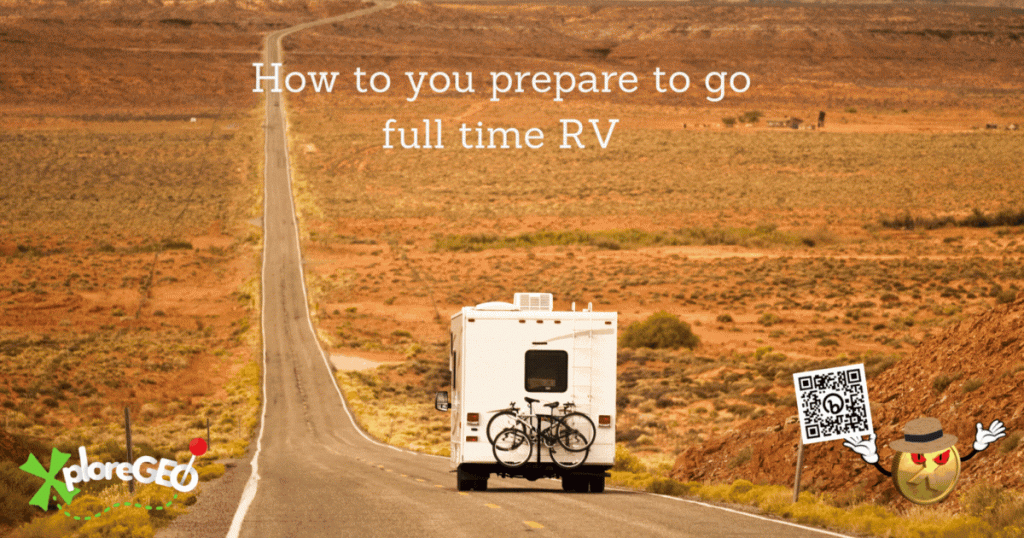If you are planning to go full-time RVing, there are several things you will need to consider and prepare for. Some of the most important things to think about include: Choosing the right RV for your needs: There are many different types of RVs available, from small camper vans to large motorhomes, and it’s important to choose the one that best suits your needs and budget. Consider factors such as the number of people who will be traveling with you, how much storage space you will need, and what type of terrain you will be traveling on. When choosing an RV, it is important to consider your specific needs and how you plan to use the vehicle. Here are a few things to keep in mind:
- Size: Consider the number of people who will be traveling with you and the amount of living space you will need.
- Type: There are several types of RVs to choose from, including travel trailers, fifth wheels, and motorhomes. Each type has its own set of pros and cons.
- Budget: Determine a budget for your RV and stick to it. Remember to factor in the cost of maintenance and repairs, as well as fuel and insurance.
- Features: Consider the features you will need, such as a kitchen, bathroom, and sleeping quarters.
- Towing capacity: If you plan on towing a car or boat behind your RV, make sure that the vehicle you choose has enough towing capacity to handle the load.
- How often you will use it: If you plan to use your RV frequently, consider one with higher-end amenities and durable construction.
- Research: Research different models and brands to find one that fits your needs and budget. Read reviews and talk to other RV owners to get a sense of the pros and cons of different models. A good way to research RVs is to go RV shows, which can be searched for locations and dates on Google
It is also important to test drive the RV before you make a purchase, if possible, to ensure that it feels comfortable and that all systems are working properly.
Figuring out your budget: RVing can be a relatively affordable way to travel, but it’s still important to plan your budget carefully. Consider expenses such as the cost of the RV, fuel, campgrounds and other accommodations, food, and any maintenance or repairs that may be needed.
Planning your route: Before you hit the road, it’s a good idea to plan out your route and make reservations at campgrounds or other accommodations along the way. This will help you avoid getting stranded in unfamiliar areas and ensure that you have a place to stay each night.
Stocking up on supplies: When you’re living in an RV, space is limited, so it’s important to carefully plan what you will need to bring with you. Make a list of essentials such as food, water, toiletries, and other supplies, and try to stick to it as closely as possible.
Here is a list of supplies that you may need if you plan to go full-time RVing:
Basic kitchen supplies: plates, cups, utensils, pots and pans, cooking oil, and other basic cooking essentials.
Bed linens and towels: You’ll need bed sheets, pillowcases, and blankets for the beds in your RV, as well as towels for the bathroom.
Personal hygiene items: toothpaste, soap, shampoo, toilet paper, and other personal hygiene items.
First aid kit: include essential items like band-aids, pain relievers, and antiseptic cream.
Cleaning supplies: You’ll need items like cleaning solution, sponges, and paper towels to keep your RV clean.
Clothing and footwear: Bring clothing and footwear suitable for the weather and activities you plan to do.
Entertainment: Bring books, games, and other forms of entertainment for days when you’re not out exploring.
RV-specific items: You’ll need items like RV toilet paper, holding tank chemicals, and a water hose to properly maintain your RV.
Power and sanitation: ensure you have necessary items for power and sanitation like batteries, generator, solar panels, and sewage hoses.
Maps and GPS: It’s always a good idea to have maps of the area you plan to visit, as well as a GPS device or smartphone to help you navigate.
Insurance: Make sure you have insurance coverage for your RV and any vehicles or other belongings you plan to bring along.
Emergency supplies: Have a emergency kit on hand with items like a flashlight, a first aid kit, and a basic tool kit.
This list is not exhaustive, it’s always a good idea to plan ahead and consider what you may need for the specific places you plan to visit and the specific activities you plan to do.
Learning about RV maintenance and repair: RVs require regular maintenance and may occasionally need repairs. It’s a good idea to learn about basic RV maintenance and how to fix common problems, such as changing a flat tire or checking the fluid levels. This will help you stay on the road and avoid costly repairs.
Overall, the key to successful full-time RVing is to plan ahead, be flexible, and be prepared for anything. By considering these factors and making the necessary preparations, you can ensure that your RV adventure is safe, enjoyable, and hassle-fre
You may be asking yourself why would a Travel Adventure Game website like XploreGEO would be presenting a blog about going full time RV. I agree it does seem strange but it really is not that strange and to me makes total sense. See for the past 14 years I have played Geocache, and for the last 17 months I have been a full time RVer, and I have found my desire to explore new places has increased 10x, and my spontanaity to just pick-up and go on an adventure quest has also increased 10x. AFter take a few polls I have also found that a large manority of full time RVers play games such as Geocache and love exploring. So it just seems to go hand-in-hand XploreGEO and RVing and that is why I’m introducing blogs related to RVing.
Look forward to more RV related blogs in the near future, until then check out this blog on 7 steps for planning Adventure Quest travel.





